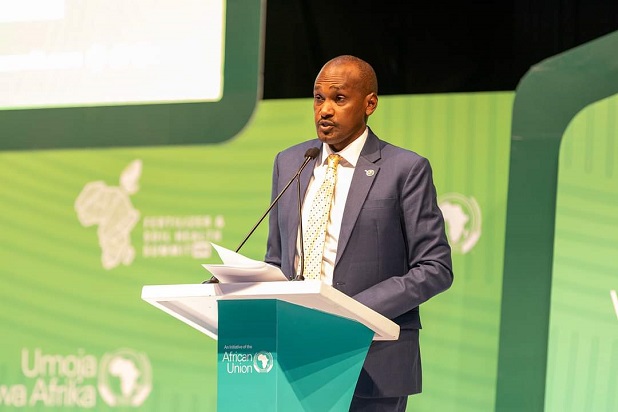Minister Tumwebaze speaking at the opening of the summit
Uganda’s Minister for Agriculture, Animal Industry and Fisheries (MAAIF), Frank K. Tumwebaze, has urged farmers to improve the health of their soils so as to increase productivity.
Tumwebaze, who is also the Chair of African Union’s Specialized Technical Committee On Agriculture, Rural Development, Water and Environment at the ongoing Africa Fertilizer And Soil Health Summit 2024 at Kenyatta International Convention Centre (Kicc), Nairobi, Kenya.
The Africa Fertilizer and Soil Health Summit is organized by the African Union Commission.
Tumwebaze said agriculture remains central to Africa’s growth and poverty reduction. In Uganda, he said, it employs nearly 70% of the population and contributes approximately 24% of the Gross Domestic Product (GDP), generating 40% of the country’s exports and 60% of raw materials for industries.
“But we cannot speak agriculture without talking about soil health and fertilizers! The theme of this Summit is “Listen to the Soil”. We are being requested to pay attention to our soils. To understand them and what they need. To manage them better for both current and future generations. For degraded soils, it means rehabilitating them and making them more productive. It is my expectation that during this Summit, we shall hear about good practices and technologies that can help our farmers to manage their soils better. It means taking actions that rejuvenate our soils, especially practices that will increase organic matter content in our soils. It also means educating and encouraging our farmers to uptake tested and proven soil management practices applicable to local contexts,” Tumwebaze said.
He noted that the Food and Agriculture Organization reports that about 33% of the Earth’s soils are already degraded and over 90% could become so by year 2050. It further notes that approximately, 820 million and 2 billion people are food and nutrition insecure, respectively, largely arising from diminished soil production and productivity.
“You are also aware that crop yields in Africa are only one third (1/3) of the global yield average. Part of the solution to raise crop yields is to increase fertilizer application on the continent, currently averaging about 18kg per hectare, less than 50% of the target of 50kg per hectare that was set in 2006 in Abuja, Nigeria during the first fertilizer summit. Moreover, these averages masks deeper disparities within individual countries. For instance, in Uganda, our average stands at 2Kgs per hectare. Again, during this summit, I hope to hear about what can be done to increase fertilizer consumption on the continent, not for the sake of it, but to increase agricultural productivity because Africa needs it if we are to feed our people and reduce vulnerability to the shocks to our food systems. I want to hear what we need to do to make fertilizers, both organic and inorganic, more affordable and accessible to our farmers,” he said.
He added that Africa needs to overcome the challenges that are limiting fertilizer use that are common among our Countries. These include:
1. Cost of the fertilizers especially on account of importation from far-off sources resulting into high transport costs that translate into high fertilizer prices.
2. The perception that our soils are inherently with high fertility without appreciating nutrient depletion through harvested crop biomass. While this fertility perception may have been true in the past, the constant cultivation over the years, without nutrient replenishment, has left our soils highly degraded.
3. Low investments in local fertilizer production to exploit the abundantly available raw materials. Uganda for instance has abundant phosphate deposits and with the emerging oil sector, nitrogen will be available.
4. Low capacity and knowledge by small holder farmers on how to replenish the lost soil nutrients, hence need for deliberate efforts to educate farmers on use of organic, inorganic and bio-fertilizers to sustain, rehabilitate and enhance soil fertility. It is also critical that we provide appropriate knowledge by conducting in-country soil testing, soil mapping, zoning, and fertilizer performance trials to guide recommendations regularly for integrated nutrient management
5. Fertilizer importation is Capital intensive and to break-even, you need to import large volumes. This calls for access to affordable finances to facilitate the trade. The implication of this is that very few private sector players venture into it leading to low volumes on the market.
“Addressing these and more challenges to ensuring rehabilitation and enhancement of soil health will be critical for the future of agriculture, food, animal feed, nutrition and income security among our people,” Tumwebaze said.
He also revealed that the AU Summit in February this year and the Executive Council endorsed both the 10-year Africa Fertilizer and Soil Health Action Plan, and the Soil Initiative for Africa policy framework.






